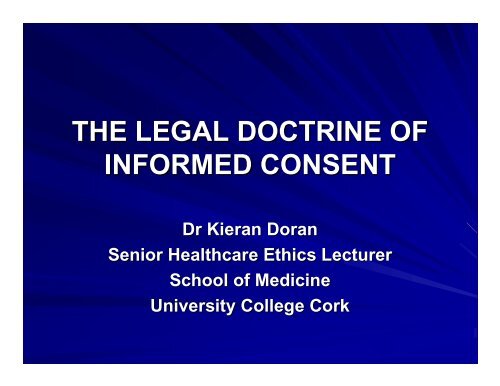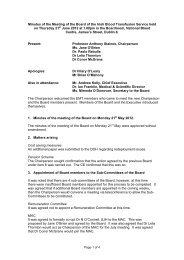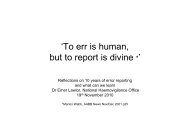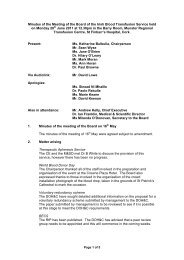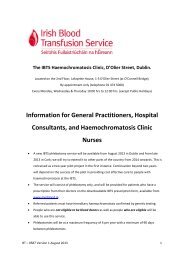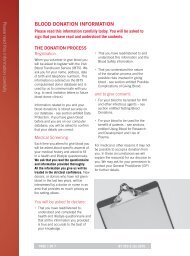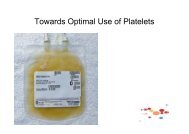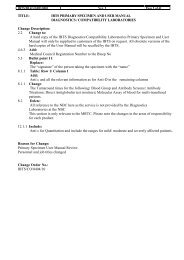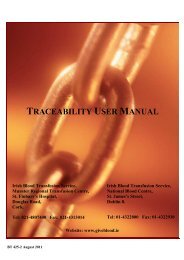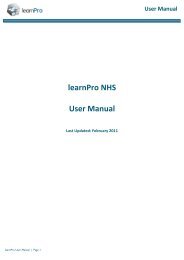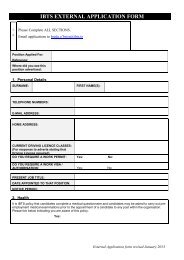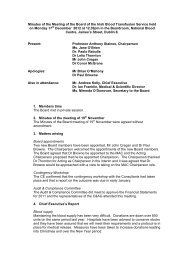Consent to transfusion - Irish Blood Transfusion Service
Consent to transfusion - Irish Blood Transfusion Service
Consent to transfusion - Irish Blood Transfusion Service
You also want an ePaper? Increase the reach of your titles
YUMPU automatically turns print PDFs into web optimized ePapers that Google loves.
THE LEGAL DOCTRINE OF<br />
INFORMED CONSENT<br />
Dr Kieran Doran<br />
Senior Healthcare Ethics Lecturer<br />
School of Medicine<br />
University College Cork
THE LEGAL DOCTRINE OF<br />
INFORMED CONSENT:<br />
THE BASIC PRINCIPLES<br />
The Ethical and Professional Principle<br />
of Patient Au<strong>to</strong>nomy in Law<br />
“Every human being of adult years and sound<br />
mind has a right <strong>to</strong> determine what shall be<br />
done with his own body; and a Surgeon who performs<br />
an operation without the Patient’s <strong>Consent</strong> commits an<br />
Assault.”<br />
Schloendorff v Society of New York Hospital<br />
[1914] 211 NY 125
THE LEGAL DOCTRINE OF<br />
INFORMED CONSENT:<br />
THE BASIC PRINCIPLES<br />
The Constitutional Principle of<br />
Personal Au<strong>to</strong>nomy and Bodily Integrity<br />
In Re Ward of Court<br />
(Withholding of Medical Treatment) No 2<br />
[1996] 2 IR 79<br />
Article 40.3.1<br />
“The State guarantees in its laws <strong>to</strong> respect, and as far<br />
as is reasonably practicable, by its laws <strong>to</strong> defend and<br />
vindicate the personal rights of the <strong>Irish</strong> Citizen.”
THE LEGAL DOCTRINE OF<br />
INFORMED CONSENT:<br />
THE BASIC PRINCIPLES<br />
The Constitutional Principle of<br />
Personal Au<strong>to</strong>nomy and Bodily Integrity<br />
In Re Ward of Court<br />
(Withholding of Medical Treatment) No 2<br />
[1996] 2 IR 79<br />
Article 40.3.2<br />
“The State is obliged <strong>to</strong> by its laws <strong>to</strong> protect as best it<br />
may from unjust attack and, in the case of injustice<br />
done, vindicate the life, person, good name and<br />
property rights of every citizen.”
THE LEGAL DOCTRINE OF<br />
INFORMED CONSENT:<br />
THE BASIC PRINCIPLES<br />
The Constitutional Principle of<br />
Personal Au<strong>to</strong>nomy and Bodily Integrity<br />
Fitzpatrick v K [2008] IEHC 104<br />
Mr Justice Laffoy<br />
“A competent Adult is free <strong>to</strong> reject Medical<br />
Advice or decline Medical Treatment.”
THE LEGAL DOCTRINE OF<br />
INFORMED CONSENT:<br />
THE BASIC PRINCIPLES<br />
The Legislative Principle of Au<strong>to</strong>nomy and<br />
Freedom of Religious Belief<br />
S. 4 (1) of the Health Act 1953:<br />
“Nothing in this Act or any instrument hereunder shall<br />
be construed as imposing an obligation on any person<br />
<strong>to</strong> avail himself or any service provided under this Act<br />
or <strong>to</strong> submit himself or any person for whom he is<br />
responsible <strong>to</strong> health examination or treatment.”
THE LEGAL DOCTRINE OF<br />
INFORMED CONSENT:<br />
THE BASIC PRINCIPLES<br />
The Legislative Principle of Au<strong>to</strong>nomy and<br />
Freedom of Religious Belief<br />
S. 4 (2) of the Health Act 1953:<br />
“Any person who avails himself of any service<br />
provided under this Act shall not be under any<br />
obligation <strong>to</strong> submit himself or any person for whom<br />
he is responsible <strong>to</strong> a health examination or treatment<br />
which is contrary <strong>to</strong> the teaching of his religion.”
THE LEGAL DOCTRINE OF<br />
INFORMED CONSENT:<br />
THE BASIC PRINCIPLES<br />
The Legislative Principle of Au<strong>to</strong>nomy and<br />
Freedom of Religious Belief<br />
Ss 4 (1) and (2) of the Health Act 1953<br />
Approved by the Supreme Court in the case of<br />
North Western Health Board v W (H) [2001] 3 IR 622
THE LEGAL DOCTRINE OF<br />
INFORMED CONSENT:<br />
THE KEY ELEMENTS<br />
The Tort of Battery;<br />
Defence <strong>to</strong> the Tort of Battery:<br />
Informed <strong>Consent</strong>;<br />
Express <strong>Consent</strong>;<br />
Implied <strong>Consent</strong>;<br />
Standard of Care in Informed <strong>Consent</strong>;<br />
Causation in Informed <strong>Consent</strong>;<br />
Exceptions <strong>to</strong> the Legal Doctrine of<br />
Informed <strong>Consent</strong>.
THE LEGAL DOCTRINE OF<br />
INFORMED CONSENT:<br />
THE TORT OF BATTERY<br />
The Tort of Battery is committed by intentionally<br />
bringing about a harmful or offensive contact with<br />
the person of the Patient. It represents the<br />
importance of the individual Patient’s right <strong>to</strong><br />
determine what should or should not be done <strong>to</strong><br />
his/her body, and this includes any bodily <strong>to</strong>uching<br />
of the person of the Patient without his/her<br />
<strong>Consent</strong>.
THE LEGAL DOCTRINE OF<br />
INFORMED CONSENT:<br />
THE TORT OF BATTERY<br />
The Tort of Battery is also a potential action<br />
Where there has been a particularly egregious<br />
defect in warning the Patient, such that it<br />
amounts <strong>to</strong> misleading the Patient about a key<br />
ingredient of the proposed Medical Procedure<br />
or Treatment. It may contain the following<br />
elements:
THE LEGAL DOCTRINE OF<br />
INFORMED CONSENT:<br />
THE TORT OF BATTERY<br />
Failure <strong>to</strong> Disclose the nature of the<br />
Medical Procedure or Treatment<br />
(R v Williams [1923] 1 KB 340)<br />
Failure <strong>to</strong> Disclose Lack of Qualifications<br />
(R v Tabassum [2000] 2 CR App Rep 328 &<br />
R v Richardson 43 BMLR 21)<br />
Carrying out an Unnecessary Medical Procedure<br />
(Apple<strong>to</strong>n v Garrett 34 BMLR 23)
THE LEGAL DOCTRINE OF<br />
INFORMED CONSENT:<br />
THE TORT OF BATTERY<br />
Daniels v Heskin [1954] IR 73<br />
“ All depends on the circumstances, the<br />
character of the Patient, her health, her social<br />
position, her intelligence, the nature of the<br />
tissue in which the needle was embedded<br />
Here the Patient was passing through a post<br />
partum period in which the possibility of<br />
nervous or mental disturbance is no<strong>to</strong>rious.”
THE LEGAL DOCTRINE OF<br />
INFORMED CONSENT:<br />
THE TORT OF BATTERY<br />
Malette v Schulman [1988] 47 DLR 8<br />
If the Patient does not give, or fails <strong>to</strong> give,<br />
his/her <strong>Consent</strong> <strong>to</strong> the proposed treatment<br />
or procedure, and it is subsequently carried out,<br />
then the constituent elements of the Tort of<br />
Battery are present.
THE LEGAL DOCTRINE OF<br />
INFORMED CONSENT:<br />
THE TORT OF BATTERY AND ASSAULT<br />
Walsh v Family Planning <strong>Service</strong>s [1992] 1 IR 496<br />
Where there is no Informed <strong>Consent</strong> acquired by the<br />
Medical Practitioner from the Patient or the Medical<br />
Practitioner negligently fails <strong>to</strong> get an Informed<br />
<strong>Consent</strong> from the Patient, then a claim for Assault<br />
under the Criminal Law can arise.
THE LEGAL DOCTRINE OF<br />
INFORMED CONSENT:<br />
THE TORT OF BATTERY AND ASSAULT<br />
Reibl v Hughes [1980] 114 DLR 1<br />
A claim for Assault under the Criminal Law should be<br />
confined <strong>to</strong> cases where there is no Informed <strong>Consent</strong><br />
<strong>to</strong> the particular procedure and it was feasible for the<br />
Medical Practitioner <strong>to</strong> acquire the Informed <strong>Consent</strong><br />
from the Patient.
THE LEGAL DOCTRINE OF<br />
INFORMED CONSENT:<br />
DEFENCE TO THE TORT OF BATTERY<br />
The Defence of <strong>Consent</strong> allows a Medical<br />
Practitioner <strong>to</strong> come in<strong>to</strong> contact with the person of<br />
the Patient without fear of committing the Tort of<br />
Battery. . To be effective:<br />
<strong>Consent</strong> must be freely given;<br />
Patient must be capable of giving <strong>Consent</strong>; and<br />
Patient’s consent must be an Informed <strong>Consent</strong>, i.e.<br />
the Patient must have the required information about the<br />
nature of the proposed treatment or procedure.
THE LEGAL DOCTRINE OF<br />
INFORMED CONSENT:<br />
DEFENCE TO THE TORT OF BATTERY<br />
Chatter<strong>to</strong>n v Gerson [1981] 1QB 431<br />
A Patient will only succeed in a Claim for the<br />
Tort of Battery if the <strong>Consent</strong> is not real, , and<br />
the Claim will fail if the Medical Practitioner has<br />
informed him/her in general terms as <strong>to</strong> the<br />
nature and the risks involved in the proposed<br />
procedure.
THE LEGAL DOCTRINE OF<br />
INFORMED CONSENT:<br />
DEFENCE TO THE TORT OF BATTERY<br />
Siddaway Bethlem Royal Hospital<br />
[1985] 1 AC 871<br />
<strong>Consent</strong> is not negated by a failure on the part of the Medical<br />
Practitioner <strong>to</strong> give the Patient sufficient information.<br />
However, it is not a proper <strong>Consent</strong> if it is obtained from the PatientP<br />
through fraud or misrepresentation on the part of the<br />
Medical Practitioner.<br />
The question <strong>to</strong> be asked is not whether sufficient information had h<br />
been disclosed <strong>to</strong> the Patient by the Medical Practitioner <strong>to</strong> enable<br />
them <strong>to</strong> make an Informed <strong>Consent</strong>.
THE LEGAL DOCTRINE OF<br />
INFORMED CONSENT:<br />
DEFENCE TO THE TORT OF BATTERY<br />
Siddaway v Bethlem Royal Hospital<br />
[1985] 1 AC 871<br />
Instead, the issue <strong>to</strong> be addressed is whether<br />
or not a PRUDENT Medical Practitioner<br />
would have acted as the Defendant Medical<br />
Practitioner has done in releasing only certain<br />
amount of information <strong>to</strong> the Plaintiff Patient.
THE LEGAL DOCTRINE OF<br />
INFORMED CONSENT:<br />
DEFENCE TO THE TORT OF BATTERY<br />
Walsh v Family Planning <strong>Service</strong>s<br />
[1992] 1 IR 496<br />
The Tort of Battery will only be held <strong>to</strong> have<br />
been committed in the event that there is no<br />
Informed <strong>Consent</strong> <strong>to</strong> the proposed procedure<br />
given by the Patient, and that it was feasible <strong>to</strong><br />
look for and obtain the Patient’s Informed<br />
<strong>Consent</strong>.
THE LEGAL DOCTRINE OF<br />
INFORMED CONSENT:<br />
EXPRESS CONSENT<br />
Express <strong>Consent</strong> is given when the Patient<br />
clearly states that he/she is willing <strong>to</strong> go ahead<br />
with the proposed procedure. This can take the<br />
form of a verbal discussion in which the Medical<br />
Practitioner explains the benefits <strong>to</strong> be expected<br />
and the risks <strong>to</strong> be incurred when opting for the<br />
proposed procedure. It can, and should where<br />
possible, be given in writing, i.e. a <strong>Consent</strong> Form.
THE LEGAL DOCTRINE OF<br />
INFORMED CONSENT:<br />
IMPLIED CONSENT<br />
Implied <strong>Consent</strong> is given many times in general clinical<br />
practice. It extends <strong>to</strong> the realms of examination,<br />
investigation, and treatment.<br />
An example of this is where the Patient holds out his/her<br />
arm in preparation for a blood sample being taken by a<br />
Medical Practitioner.<br />
Similarly, a Patient who takes a prescription from a<br />
Medical Practitioner and then visits the Pharmacy is<br />
consenting <strong>to</strong> the course of medication prescribed.
THE LEGAL DOCTRINE OF<br />
INFORMED CONSENT:<br />
THE STANDARD OF CARE IN<br />
INFORMED CONSENT<br />
Medical Paternalism v<br />
Patient Self-Determination<br />
Medical Judgement v<br />
Patient’s Right <strong>to</strong> Know
THE LEGAL DOCTRINE OF<br />
INFORMED CONSENT:<br />
THE STANDARD OF CARE IN<br />
INFORMED CONSENT<br />
There is a balance <strong>to</strong> be struck between the<br />
benefits of the proposed procedure for the<br />
Patient, and the risk of any potential side<br />
effects. . The Medical Practitioner owes the Patient<br />
a Duty of Care <strong>to</strong> ensure the right balance is<br />
struck in this regard, as his/her clinical decision(s)<br />
will directly affect the Patient.
THE LEGAL DOCTRINE OF<br />
INFORMED CONSENT:<br />
THE STANDARD OF CARE IN<br />
INFORMED CONSENT<br />
A Medical Practitioner is not negligent in obtaining the Patient’s<br />
Informed <strong>Consent</strong> if he/she only discloses the risks that would have<br />
been mentioned by a responsible Body of Medical Opinion.<br />
The Court has <strong>to</strong> be satisfied that there is a logical basis <strong>to</strong> the<br />
approach adopted by the Responsible Body of Medical Opinion in<br />
question.<br />
A Medical Practitioner is under a Duty of Care <strong>to</strong> provide the Patient<br />
with the information necessary <strong>to</strong> enable the Patient <strong>to</strong> make a<br />
balanced judgement regarding the proposed treatment or procedure,<br />
and hence give an Informed <strong>Consent</strong> <strong>to</strong> the Medical Practitioner.
THE LEGAL DOCTRINE OF<br />
INFORMED CONSENT:<br />
THE STANDARD OF CARE IN<br />
INFORMED CONSENT<br />
Siddaway v Bethelehem Royal Hospital<br />
[1985] 1 AER 871<br />
A Medical Practitioner is not Negligent in obtaining a<br />
Patient’s <strong>Consent</strong> if he/she only discloses the risk that<br />
would have been mentioned by a Responsible Body of<br />
Medical Opinion.<br />
A Medical Practitioner is under a duty <strong>to</strong> provide the<br />
Patient with the information necessary <strong>to</strong> make a<br />
balanced judgement regarding the proposed treatment<br />
or procedure.
THE LEGAL DOCTRINE OF<br />
INFORMED CONSENT:<br />
THE STANDARD OF CARE IN<br />
INFORMED CONSENT<br />
Canterbury v Spence<br />
[1972] 464 F 2d 772<br />
A Patient of adult years and sound mind has a right <strong>to</strong><br />
determine what shall be done with his/her body.<br />
It is the Medical Practitioner’s duty <strong>to</strong> warn of any risks<br />
in the proposed treatment or procedure and <strong>to</strong> give the<br />
information <strong>to</strong> which the Patient is entitled. The test for<br />
determining whether a risk should be divulged is its<br />
“Materiality”.
THE LEGAL DOCTRINE OF<br />
INFORMED CONSENT:<br />
THE STANDARD OF CARE IN<br />
INFORMED CONSENT<br />
Canterbury v Spence<br />
[1972] 464 F 2d 772<br />
A risk is considered “Material” if a<br />
reasonable person, from what the Medical<br />
Practitioner knows or should know <strong>to</strong> be the<br />
Patient’s position, would be likely <strong>to</strong> attach<br />
significance <strong>to</strong> that risk when reaching his/her<br />
decision re: the proposed treatment or<br />
procedure.
THE LEGAL DOCTRINE OF<br />
INFORMED CONSENT:<br />
THE STANDARD OF CARE IN<br />
INFORMED CONSENT<br />
Rogers v Whitaker<br />
[1992] 67 ALJR 47<br />
While the accepted Medical Practice of a<br />
Responsible Body of Medical Opinion is a<br />
useful guide for the Court <strong>to</strong> use, the Court itself<br />
is <strong>to</strong> be guided by the appropriate Standard of<br />
Care that gives weight <strong>to</strong> the paramount<br />
consideration namely that a Patient is entitled <strong>to</strong><br />
make decisions about any proposed treatment<br />
or procedure.
THE LEGAL DOCTRINE OF<br />
INFORMED CONSENT:<br />
THE STANDARD OF CARE IN<br />
INFORMED CONSENT<br />
Rogers v Whitaker<br />
[1992] 67 ALJR 47<br />
A Medical Practitioner would breach his/her duty if<br />
he/she failed <strong>to</strong> warn a Patient of a Material Risk<br />
inherent in the proposed treatment or procedure.<br />
A “Material Risk” is defined as one that a reasonable<br />
person in the Patient’s position, if warned of the risk,<br />
would be likely <strong>to</strong> attach significance <strong>to</strong> it.
THE LEGAL DOCTRINE OF<br />
INFORMED CONSENT:<br />
THE STANDARD OF CARE IN<br />
INFORMED CONSENT<br />
Walsh v Family Planning <strong>Service</strong>s<br />
[1992] 1 IR 496<br />
A prudent Medical Practitioner will disclose all<br />
the relevant facts in an operation governing Sexual<br />
Capacity. The Court needs <strong>to</strong> know the following:<br />
• The Medical Practitioner’s judgement as <strong>to</strong> the<br />
consequences of disclosure <strong>to</strong> the Patient, and<br />
• The accepted Medical Practice in such<br />
circumstances.
THE LEGAL DOCTRINE OF<br />
INFORMED CONSENT:<br />
THE STANDARD OF CARE IN<br />
INFORMED CONSENT<br />
Walsh v Family Planning <strong>Service</strong>s<br />
[1992] 1 IR 496<br />
In Elective Procedures, , such as a Vasec<strong>to</strong>my,<br />
there is a duty on the part of the Medical<br />
Practitioner <strong>to</strong> warn the Patient, despite the<br />
statistically negligible chance of any<br />
complication arising such as Orichalgia which<br />
emerged in the post Elective Procedure period.
THE LEGAL DOCTRINE OF<br />
INFORMED CONSENT:<br />
THE STANDARD OF CARE IN<br />
INFORMED CONSENT<br />
Geoghegan v Harris (High Court 21 June 2000)<br />
A more recent case before the High Court on the issue of pre-treatment<br />
disclosure was where the Plaintiff Patient alleged Negligence in the<br />
carrying out of a dental implant by the Defendant Dentist, during g the<br />
course of which a bone graft was taken from the Plaintiff Patient t ’s chin.<br />
This was alleged <strong>to</strong> have damaged a nerve in the front of the e chin and<br />
left the Patient with chronic neuropathic pain. It was alleged that t<br />
the<br />
Defendnat Dentist failed <strong>to</strong> disclose in advance of the operation the risk<br />
that such pain might be a consequence of the procedure.
THE LEGAL DOCTRINE OF<br />
INFORMED CONSENT:<br />
THE STANDARD OF CARE IN<br />
INFORMED CONSENT<br />
Geoghegan v Harris (High Court 21 st June 2000)<br />
The Defendant Dentist accepted that he did not disclose this risk k as he<br />
was of the view that he had a duty <strong>to</strong> give information about rare<br />
complications where the risk exceeded 1%.<br />
The Defendant Dentist did not consider that this pain was associated<br />
ated<br />
with the proposed procedure. The Plaintiff Patient said that he would not<br />
have undergone the procedure even if the risk was 0.1%. Kearns J., J<br />
having reviewed the cases in this area, observed that whichever<br />
approach was taken <strong>to</strong> determining the standard of disclosure, the e same<br />
conclusion was reached as regards the most critical elements, namely:
THE LEGAL DOCTRINE OF<br />
INFORMED CONSENT:<br />
THE STANDARD OF CARE IN<br />
INFORMED CONSENT<br />
Geoghegan v Harris (High Court 21 June 2000)<br />
The requirement <strong>to</strong> give a warning of any Material Risk<br />
which is a known complication of a course of treatment or<br />
clinical procedure properly carried out; and<br />
The test of Materiality in Elective Procedures is <strong>to</strong> enquire<br />
whether there is any risk, however exceptional or remote, of<br />
grave consequences involving pain for an appreciable time<br />
in<strong>to</strong> the future. The statistical frequency of the Material Risk<br />
is irrelevant.
THE LEGAL DOCTRINE OF<br />
INFORMED CONSENT:<br />
CAUSATION IN INFORMED CONSENT<br />
There are three elements <strong>to</strong> Causation in regard<br />
<strong>to</strong> Informed <strong>Consent</strong>:<br />
Was the Patient informed of the potential complication<br />
in respect of the proposed treatment or procedure?<br />
If not, would a Respected Body of Medical Opinion have<br />
informed the Patient of the complication in respect of the<br />
proposed treatment or procedure?<br />
If the Patient had been informed of the potential<br />
complication, would they have gone ahead with<br />
the proposed treatment or procedure?
THE LEGAL DOCTRINE OF<br />
INFORMED CONSENT:<br />
LEGAL EXCEPTIONS TO INFORMED CONSENT<br />
Emergency<br />
Minors<br />
Mental Incompetence
THE LEGAL DOCTRINE OF<br />
INFORMED CONSENT:<br />
LEGAL EXCEPTIONS TO INFORMED CONSENT<br />
EMERGENCY<br />
Marshall v Curry [1933] 3 DLR 260<br />
Parmley v Parmley & Yule [1945] 4 DLR 81<br />
Murray v McMurchy [1949] 2 DLR 442
THE LEGAL DOCTRINE OF<br />
INFORMED CONSENT:<br />
LEGAL EXCEPTIONS TO INFORMED CONSENT<br />
MINORS<br />
W v W [1972] AC 24<br />
Gillick v West Norfolk & Wisbech AHA [1985] 402<br />
In Re R [1991] 4 AER 177<br />
North Western Health Board v W (H) [2001] 3 IR 622<br />
Non-Offences Against the Person Act 1997<br />
Child Care Act 1991
THE LEGAL DOCTRINE OF<br />
INFORMED CONSENT:<br />
LEGAL EXCEPTIONS TO INFORMED CONSENT<br />
MENTAL INCOMPETENCE<br />
In Re F [1990] 2 AC 1<br />
In Re C [1994] 1 WLR 29<br />
In Re Ward of Court [1996] 2 IR 73<br />
Fitzpatrick v K [2008] IEHC 104
THE LEGAL DOCTRINE OF<br />
INFORMED CONSENT:<br />
RECENT DEVELOPMENTS IN IRISH LAW<br />
CASE LAW<br />
Fitzpatrick v Eye and Ear Hospital<br />
[2007] Unreported Supreme Court<br />
“The Patient-Centred Test is preferable, and ultimately<br />
more satisfac<strong>to</strong>ry from the point of view of both Doc<strong>to</strong>r<br />
and Patient alike, than any Doc<strong>to</strong>r-Centred approach<br />
favoured by the Supreme Court in Walsh v Family<br />
Planning <strong>Service</strong>s.”
THE LEGAL DOCTRINE OF<br />
INFORMED CONSENT:<br />
RECENT DEVELOPMENTS IN IRISH LAW<br />
CASE LAW<br />
Fitzpatrick v Eye and Ear Hospital<br />
[2007] Unreported Supreme Court<br />
“There are obvious reasons why in the context of<br />
elective surgery a warning given only shortly before an<br />
operation is undesirable. A Patient may be stressed,<br />
medicated or in pain in the period and may be less<br />
likely for one or more of these reasons <strong>to</strong> make a calm<br />
as well as reasoned decision in such circumstances.”
THE LEGAL DOCTRINE OF<br />
INFORMED CONSENT:<br />
RECENT DEVELOPMENTS IN IRISH LAW<br />
CASE LAW<br />
In Re K<br />
[2007] Unreported Supreme Court<br />
This case approved the ratio in the case of In<br />
Re Ward of Court adjudicated on in the<br />
Supreme Court in 1995. The ratio being that<br />
Medical Treatment may not be given <strong>to</strong> an<br />
Adult Person of full capacity without his/her<br />
<strong>Consent</strong>.
THE LEGAL DOCTRINE OF<br />
INFORMED CONSENT:<br />
RECENT DEVELOPMENTS IN IRISH LAW<br />
CASE LAW<br />
In Re K<br />
[2007] Unreported Supreme Court<br />
However the Court also accepted the ratio in<br />
the case of At<strong>to</strong>rney-General v X [1992] 1 IR 1<br />
that a Mother’s Personal Au<strong>to</strong>nomy is limited<br />
where there is a conflict with the legal rights of<br />
the foetus.
THE LEGAL DOCTRINE OF<br />
INFORMED CONSENT:<br />
RECENT DEVELOPMENTS IN IRISH LAW<br />
CASE LAW<br />
In Re K<br />
[2007] Unreported Supreme Court<br />
According <strong>to</strong> Justice Hederman in the Supreme Court:<br />
“There is no legal recognition of a Mother’s Right of<br />
Self-Determination which can give priority over the<br />
protection of unborn life. The creation of a new life,<br />
involving as it does pregnancy, birth and raising a<br />
child, necessarily involves some restriction of a<br />
Mother’s freedom of Self-Determination.”
LEGISLATION<br />
THE LEGAL DOCTRINE OF<br />
INFORMED CONSENT:<br />
RECENT DEVELOPMENTS<br />
The Power of At<strong>to</strong>rney Act 1996<br />
Future Legislation<br />
Mental Capacity Bill 2008<br />
Advanced Directives/Living Wills
THE LEGAL DOCTRINE OF<br />
INFORMED CONSENT<br />
THANK YOU!<br />
Dr Kieran Doran<br />
Senior Healthcare Ethics Lecturer<br />
School of Medicine<br />
University College Cork<br />
(021) 4901513<br />
K.Doran@ucc.ie


